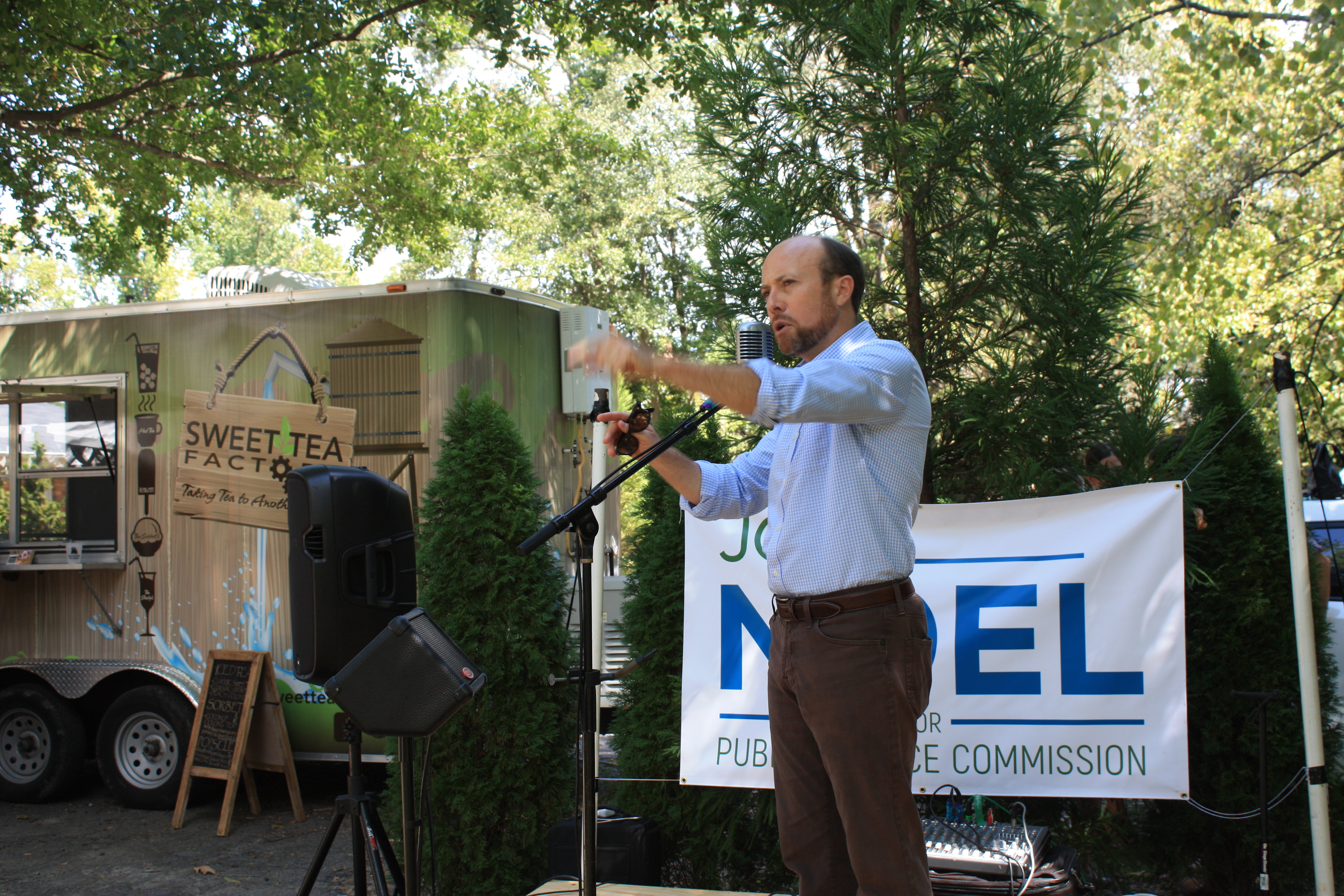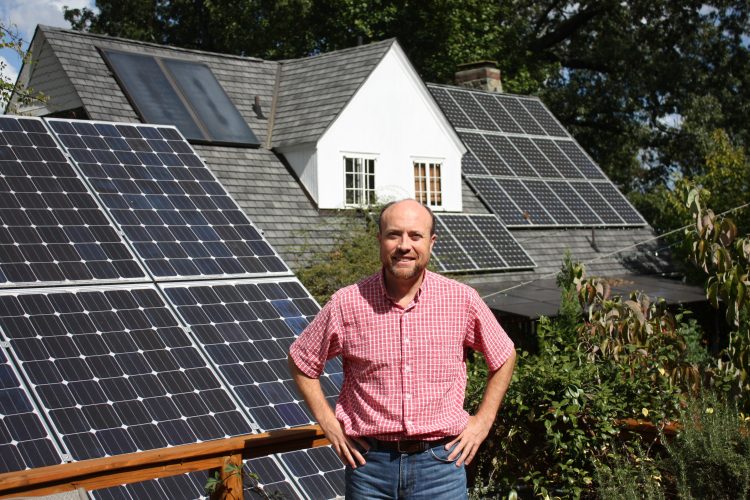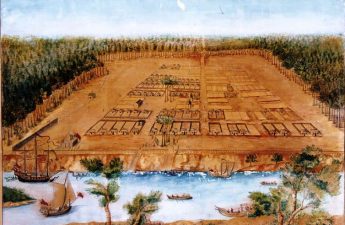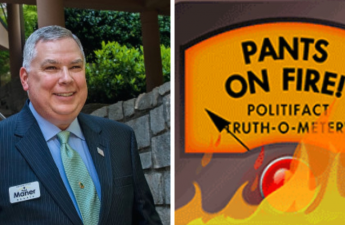PSC candidate John Noel wants Georgia’s energy future to be solar-powered
By Jonathan Grant
 Republican victories in Georgia Public Service Commission races have been so predictable in recent years that Democrats haven’t bothered to field a candidate in three of the past five elections. Next year is shaping up to be quite different for the state’s asleep-at-the-wheel all GOP regulatory agency, however.
Republican victories in Georgia Public Service Commission races have been so predictable in recent years that Democrats haven’t bothered to field a candidate in three of the past five elections. Next year is shaping up to be quite different for the state’s asleep-at-the-wheel all GOP regulatory agency, however.
Here’s why:
- Democrats are energized.
- Georgia Power’s troubled $25 billion (and counting) Plant Vogtle expansion has put a harsh spotlight on the PSC and its past decisions.
- Candidate John Noel, a colorful, dynamic energy-efficiency expert and walk-the-walk solar power advocate with political chops. The former Democratic state legislator with an unforgettable nickname is grabbing endorsements and making a splash with a knockout YouTube video.
Seriously, you’ve got to meet this guy.
Talking Solar

As a campaign staffer works on a laptop in the solar-powered office, Noel takes a break from fundraising calls to discuss his bid to unseat GOP Commissioner Chuck Eaton. But first, he talks enthusiastically about the energy upgrades he’s made to his woodsy, three-building spread, which also includes the offices of his high-efficiency lighting company.“This is an excellent day, a great day for solar,” Noel says, waving off the puffy clouds drifting over the rooftop deck of his campaign office, a converted garage next to the West Atlanta home he shares with longtime companion Wendy Hogg and a tennis ball-hawking dog named Sydney.
“I was fanatical about energy efficiency. When I moved here in the late nineties, the garage was in total disrepair,” he says, but after a renovation that included foam insulation and low-E windows, “It’s tight as a tick.” He also installed solar panels on both garage and house, along with a geothermal power system, solar thermal water heater, solar-heated swimming pool, and a rainwater collection system he uses to water his lawn. Noel, who drives a Tesla Model S, offers a public car-charging station at his house, one that’s on the public electric vehicle charging map.

He’s not off the grid yet, but a recent summer power bill for all three buildings totaled $84, including a solar credit for power sold back to the grid. Now, with the Powerwall, he can store his solar-generated output. The Powerwall also allows him to time his electricity purchases; he can charge it—and his car—at night, taking advantage of discounted, off-peak rates.In July, he became the first homeowner in Georgia to install a Tesla Powerwall 2. Fully charged, the high-capacity, 14-kilowatt lithium battery system can keep a four-bedroom house running for a full day. The setup is so impressive that Like Tesla recently featured Noel and his house in a YouTube video, “Sticking It to The Man!” with more than 55,000 views.
Pulling up an app on his smart phone, Noel looks over production and usage data. “Yesterday, we generated 23 kilowatt-hours,” he says. “We used 26 percent. 72 percent went to charge the Powerwall, and we sold 2 percent.” On this excellent October day, he figures he’ll charge up the Powerwall sufficiently from solar to carry him through the forecasted stormy weekend.
 The urge to conserve resources is deeply ingrained in Noel, who grew up on a Tennessee farm that relied on water from a spring that could run dry during the summer. He got into the energy-efficiency field after he moved to Atlanta during the 1996 Olympics. He found a job with a lighting company, and a few years later, he started Energy and Environment, installing high-efficiency lighting systems “for everybody with a big building and a flat roof.”
The urge to conserve resources is deeply ingrained in Noel, who grew up on a Tennessee farm that relied on water from a spring that could run dry during the summer. He got into the energy-efficiency field after he moved to Atlanta during the 1996 Olympics. He found a job with a lighting company, and a few years later, he started Energy and Environment, installing high-efficiency lighting systems “for everybody with a big building and a flat roof.”
The company has designed and built systems for businesses, parking decks, and military installations throughout the South and as far away as Pearl Harbor. He says he’s saved customers tens of millions of dollars in lower energy costs and estimates he can easily cut a client’s lighting costs by more than half. Noel says he’s winding down work at Energy and Environment to turn his full attention to the race.
The Short and the Sweet


This isn’t Noel’s first try to upset an entrenched incumbent. Twenty years ago, Noel’s Riverside neighborhood was Billy McKinney’s political turf. McKinney, father of former U.S. Rep./Green Party presidential candidate Cynthia McKinney, was no stranger to controversy himself and served in the Georgia House for two decades, until Noel, then a 31-year-old political newcomer and community activist, challenged him in 2002;s Democratic primary. Noel out-hustled McKinney in the majority-black district and won.
In the General Assembly, Noel became known as “The Sweet Tea Guy” for sponsoring House Bill 819 (actually, he co-sponsored it). He laughs when he tells the story, but insists that he was “legitimately angry” at the lack of pre-sweetened tea at a local restaurant one day. Yada, yada, H.B. 819 was born. It declared:This isn’t Noel’s first try to upset an entrenched incumbent. Twenty years ago, Noel’s Riverside neighborhood was Billy McKinney’s political turf. McKinney, the father of former U.S. Rep./Green Party presidential candidate Cynthia McKinney, was no stranger to controversy himself. The elder McKinney served in the Georgia House for two decades, until Noel, then a 31-year-old political newcomer and community activist, challenged him in the 2002 Democratic primary. Noel out-hustled McKinney in the majority-black district and won.
 In the General Assembly, Noel became known as “The Sweet Tea Guy” for sponsoring House Bill 819 (actually, he co-sponsored it). He laughs when he tells the story, but insists that he was “legitimately angry” at the lack of pre-sweetened tea at a local restaurant one day. Yada, yada, H.B. 819 was born. It declared:
In the General Assembly, Noel became known as “The Sweet Tea Guy” for sponsoring House Bill 819 (actually, he co-sponsored it). He laughs when he tells the story, but insists that he was “legitimately angry” at the lack of pre-sweetened tea at a local restaurant one day. Yada, yada, H.B. 819 was born. It declared:
“Any food service establishment which serves iced tea must serve sweet tea. Such an establishment may serve unsweetened tea but in such case must also serve sweet tea. Any person who violates this Code section shall be guilty of a misdemeanor of—”
“A high and aggravated nature,” Noel says with a chuckle, savoring the words years later as he sits on the deck, waving a pizza slice.
Noel called it “an attempt to bring a little humor to the Legislature,” and the bill went nowhere, but the media picked it up, and if nothing else, established him as a thoroughly Southern politician. Despite catching some grief, Noel embraces his Sweetness. He plans to feature the beverage on the campaign trail when he visits Georgia’s smaller towns. One of his earliest supporters: The Sweet Tea Factory.
Noel served only one term before court-ordered redistricting and McKinney’s campaign manager did unto him as he had done unto her boss, but in his short time in the legislature, he cosponsored legislation promoting Leadership in Energy and Environmental Design (LEED) construction for state buildings, which Noel says has saved Georgia taxpayers millions of dollars.
“Mad as Hell”
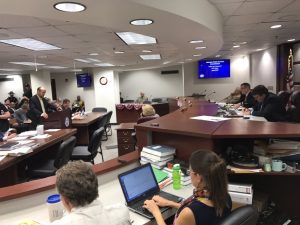
He believes the entire PSC has been captured by the companies it should be regulating. The coziness between utilities and regulators is well-documented. In 2013, the AJC reported that, among other things, a utility attorney served as campaign treasurer for two incumbents. Then there’s this: Georgia’s local telephone companies hired PSC Chairman Stan Wise’s son to run their lobbying group.Like many Democrats, Noel was energized by the 2016 elections. He’s also had an abiding interest in the PSC (he’s testified there both as legislator and citizen/energy expert). Hence the decision to run. As he explains why, his irritation shows. “I’m running because the Public Service Commission reaches into people’s wallets even more than the legislature,” he says, “and people are getting screwed. And I have a visceral reaction to getting screwed. I’m mad as hell.”
Commissioner Doug Everett first won office with a vow to reject campaign donations from utility lawyers and lobbyists with issues before the PSC. Next time around, a challenger took him to task for reneging on his promise. Everett’s reply: “The only people who care about what [the PSC does] are those who work within the utilities.”

Following the latest revelations of swampish behavior, Noel called for the PSC chairman’s resignation upon learning of Wise’s plan—announced before hearing evidence—to vote in favor of Georgia Power in the pending Vogtle case, resign his post, and then “use his relationships with those in the utility industries and knowledge to continue to help people.” In other words, he plans to reap his reward for decades of pro-utility votes and take a job, at age 65, in an industry he was supposed to regulate.
“It’s outrageous,” Noel said in his statement blasting Wise. “And unfortunately, business as usual. “If you Google ‘Georgia Public Service Commission Ethics,’ what you get is a bunch of bad news, much of it concerning Stan Wise. While I’m running against Chuck Eaton, who votes lock step with Wise, it’s just as important to challenge what Wise and Eaton represent on the commission: an anti-consumer type of crony capitalism that profits Georgia Power at the expense of ratepayers.”
Due to a lack of any meaningful oversight, Noel says, “Georgia Power has complete power over energy planning, and that’s way too much.”
Noel accuses the utility and its regulators of “dinosaur thinking” when it comes to fossil fuels. Calling for a policy shift toward energy-efficiency and renewables, Noel points to Georgia’s No. 8 ranking among states for solar potential. According to industry reports, 162,000 homes have solar power here, and the state’s solar industry employs 3,924 people. Noel would like to see most homes rely at least partly on solar, and says declining equipment and battery costs make its prospect even brighter.
The Politics of Plant Vogtle
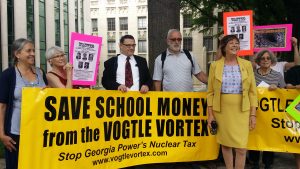
It appears that a new batch of executives at Georgia Power, well-known for corporate hubris, learned nothing from that experience. Now, more than a generation later, Plant Vogtle is an overpriced, mismanaged mess—and the only nuke currently under construction in the United States, after South Carolina bailed on Plant Sumner because the price was too damned high, among other reasons.
Georgia Power now seeks PSC approval to continue construction. The AJC article,“Time to decide if you pay more for Georgia’s nuclear debacle,” shows where things stood as the PSC began November hearings on the matter.
In the past, Georgia Power has tried to scrupulously avoid financial exposure on the plant by bringing the state’s publicly-owned utilities along for the ride, getting outlandishly pro-utility Senate Bill 31 passed in the Georgia General Assembly, wrangling billions of dollars’ worth of federal loan guarantees, and in the latest development cajoling Congressional Republicans to stick $800 million in tax credits for Vogtle into their tax bill.
Despite having all its skids greased, Georgia Power has struggled with the project. Recently its contractor went bankrupt. The situation alarms investors as well as consumers and environmentalists. Georgia Power’s parent, Southern Company, is selling off its solar assets, trying to increase its cash on hand to deal with increased debt levels and added Vogtle costs along with other woes. Noel called it “a pawn shop visit.” For construction to continue, Noel believes, the cost burden should shift from ratepayers to shareholders.
The PSC’s Vogtle hearings will culminate in a February thumbs-up or thumbs-down on continued construction. Eaton has been a reliable vote for Georgia Power, and commissioners are expected to rubber-stamp the company’s plans. Whether they’re still around if and when Vogtle goes on line is another issue, especially since Vogtle is causing political fissures. Despite a Georgia Tea Party endorsement of Plant Vogtle’s completion, not all conservatives are happy with corporate welfare and cost overruns. There are calls to roll back Senate Bill 31, the infamous legislation passed over widespread objections in 2009 that forced Georgia Power’s customers to pay Vogtle financing costs for Construction Work in Progress—a change in direct contradiction to standard ratemaking policy, which holds that people should pay for plant that is “used and useful,” not a speculative project.
Why Chuck Eaton Shouldn’t Be Cocky
When people learn about Plant Vogtle, “they become uniformly angry,” an Atlanta apartment executive testified tpe PSC last week. And if Noel gets his way, a lot of people are going to pay attention to what’s going on at the PSC.

Every statewide office could be up for grabs. Wise’s resignation should draw Democratic hopefuls into the race for his freshly picked successor’s seat. Democrat Lindy Miller of Decatur has also announced a challenge to Eaton. The PSC could provide bellwether races. Thanks, Vogtle.With more Democrats running in races up and down the ballot, party turnout should increase. And Georgia isn’t deep-red anymore. Trump won, but only took 51 percent of the vote. Recently, three GOP legislative seats flipped in special elections. If purged voting rolls are refilled and new voters added—providing they’ll be allowed to vote—Georgia could turn purple in the midterms.
Incumbents enjoy an advantage when it comes to fundraising. Attorneys and lobbyists who practice at the PSC give large sums—money not typically available to challengers. In 2012, Eaton raised over $300,000, the second-highest total ever in a PSC race. Money isn’t necessarily all-important in a down-ballot race, but Noel is building up his war chest and says he’s already raised well over $100,000.s Noel.

He’s also been busy lining support from environmentalists and local heavyweights. At the campaign’s inaugural fundraiser at his home, he gave solar home tours to dozens of supporters, served frittatas, mint juleps, and the requisite sweet tea, and received glowing endorsements from local hero Rep. Scott Holcomb , City of Atlanta’s environmental leader Stephanie Stuckey, and Atlanta BeltLine founder Ryan Gravel.
Noel plans to spend a lot of time campaigning out in the state, speaking with local news media and meet with folks to talk about telecommunications and Internet access as well as electric rates, all while serving up, you guessed it, sweet tea. And if everyone who drinks sweet tea votes …

Who knows? People may even come to realize that Republicans make horrible regulators, because, among other things, they don’t like to regulate. Really, guys. You had one job.
A year from now, the Sweet Tea Guy could leave a bitter taste in the mouths of Republicans and utility executives with a victory over Eaton. “Get me to the general election,” he told a crowd of a hundred supporters at his fund-raiser, shaking his fist, “and I’ll eat this guy alive.”
Liked this post? Follow this blog to get more.

